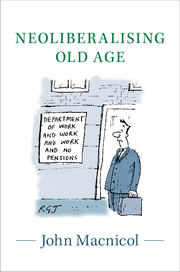8 - Conclusion
Published online by Cambridge University Press: 05 November 2015
Summary
Since the 1970s, the old age agenda has slowly but surely changed, driven by both neoliberalism as an ideology and the associated labour market restructuring that has placed the expansion of labour supply at the centre of macro-economic policy. The process of change has been slow and incremental, with every stage presented as purely evidence-driven, inevitable and apolitical – a key feature of all aspects of the neoliberal revolution. This creates interpretative difficulties – one is challenging a powerful consensus. Many who read this book will disagree with its analysis. They may prefer to take a technocratic approach, examining the dysfunctional complexity that has become a feature of the UK state pension system, notionally as a consequence of its piecemeal development since 1908, and argue that the seemingly persuasive case articulated by recent UK governments represents a ‘sensible’ compromise between difficult options. Again, they may argue that the post-2008 economic situation makes painful public expenditure constraints inevitable, or that the demographic pressures are very ‘real’, and that some other European countries are also raising their state pension ages – though at the time of writing the number is very small. Finally, they may point out that many model occupational schemes that have been run responsibly and prudently (like the John Lewis Partnership scheme in the UK) are now under fiscal and demographic pressure, and are having to reduce accrual rates.
The interpretative problem is that the demographic and pension-funding factors are both technically challenging to research and riddled with uncertainties – regarding future fertility, mortality, health, labour supply, performance of the economy and so on – which by no means present an unequivocal case for raising state pension ages; and then these uncertainties are mediated through the distorting lens of neoliberalism and thereby transformed into inevitabilities, producing highly pessimistic conclusions that justify what amounts to a major cutback in the most expensive item of the welfare state budget. However, it is clear that the largely uncritical debate in political and academic circles does not reflect popular opinion: according to a YouGov poll in May 2012, 77 per cent of UK citizens think it is unfair that state pension ages are being raised, and 62 per cent believe the policy will hit hardest at the poorest pensioners.
- Type
- Chapter
- Information
- Neoliberalising Old Age , pp. 202 - 211Publisher: Cambridge University PressPrint publication year: 2015

